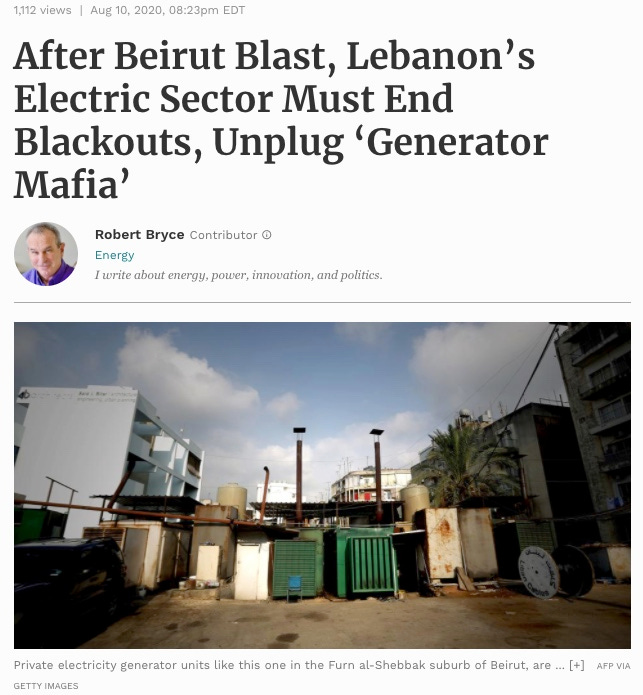2 New Podcasts; 2 New Reviews; 2 New Articles!
Happy Thursday,
In today’s email blast:
New podcasts: Avik Roy on climate and Covid-19; Joel Kotkin on his new book, The Coming of NeoFeudalism
Michael Shellenberger and John Stossel published excellent reviews of Juice
My latest articles: nat gas bans in California; the generator mafia in Beirut
New Episodes of the Power Hungry Podcast
Back in the day, Casey Kasem was playing "American Top 40." I mention that because the Power Hungry Podcast still ranks among the top 40 Science podcasts in the US and among the top 50 in Science worldwide. As Kasem might have said, it's on the charts "with a bullet" meaning its ranking is going up.
I can only attribute that modest success to the great guests we've had. Last week, I talked with my colleague, Avik Roy, the president of the Foundation for Research on Equal Opportunity, about the similarities between discussions about climate change and Covid. One of my favorite lines from Avik was this one:
What's so interesting about both the Covid debate and the climate debate is how much the word "science" is thrown around in ways that are not scientific. And there's a degree to which, in both the climate and energy debate, and in the Covid debate, all you have to do is use the word "science" and it's meant to be this kind of cloak of virtue, and there's much less attention paid to whether or not what you're doing is actually rigorously based on the evidence.
On Tuesday, we released my talk with Joel Kotkin, an author and demographer, who recently released his ninth book, The Coming of NeoFeudalism: A Warning to the Global Middle Class. Joel and I talked about his book and a wide variety of other topics, including the rise of the technocratic elite, the importance of homeownership, suburbs in the time of Covid, California’s regressive energy policies, and what he calls “the betrayal of the middle- and working-class” by policymakers. Joel's book is remarkable. I was particularly struck by how he traced the rise of the middle class (which he calls the "Yeomanry") back to the Dutch and their separation of church and state. In his book, he said that the greatest achievement of the Dutch "lay in creating a republic free from aristocratic or clerical domination.”
Both episodes are interesting. Give them a listen. While you are at it, please subscribe to the Power Hungry Podcast and encourage your friends and family to do the same. And if you love it, please go to Ratethispodcast.com/powerhungry and give it a 5-star rating.
Finally, if you want to watch the video version of the podcasts, we are posting them on YouTube.
Reviews of Juice by Shellenberger and Stossel
Michael Shellenberger wrote a fantastic review in Forbes, in which he called me (me?) “the Anthony Bourdain of energy.” But even better, he called Juice “a humane and moving new documentary.” He goes on, saying that the film “makes a compelling case for why we need more nuclear energy if we are going to slow the growth of CO2 emissions.” As you probably know, Michael's new book, Apocalypse Never, is a bestseller. He was also on the second episode of the Power Hungry Podcast.
John Stossel did a two-fer: He posted a four-minute piece on the film on his YouTube channel and also published a syndicated column on it. Stossel wrote, "Americans take electric light for granted, but Bryce's film reminds us: 'Electricity allowed us to conquer our oldest foe: darkness. For millennia, the cost of having well-lit spaces at night was so high, only the very rich could afford it.'" Stossel's piece on YouTube has already had about 125,000 views and more than 2,500 comments.
Needless to say, it is heartening to have such solid reviews.

On Monday, Real Clear Energy published my oped on the natural gas bans and restrictions in California. I wrote that while the bans are aimed at addressing climate change, they are:
in fact, regressive energy taxes that will hurt low- and middle-income consumers and in doing so, exacerbate California’s poverty problem. As I show in a new report for the Foundation for Research on Equal Opportunity, by banning the direct use of natural gas for cooking, home heating, water heaters, and clothes dryers, California regulators are aiming to force consumers to instead use more electricity which, on an energy-equivalent basis, costs four times as much as natural gas.

The devastating explosion in Beirut brought back many memories of my visit to that historic and amazing city back in 2017. Lebanon was a deeply troubled place then. The deadly explosion that leveled much of central Beirut last week has made the country's myriad problems even worse. Among the most important problems is the ongoing lack of reliable electricity. On Monday, I published a piece on Forbes about Lebanon's electricity sector and the country's "generator mafia." I wrote:
While it is too early to know what will happen to the war-torn country — and whether reformers are able to win the fight against corruption — it is clear that the future success or failure of Lebanon can be assessed by simply looking at it through the lens of electricity. That is, Lebanon’s success will be gauged on whether or not it can overcome the corruption that plagues its state-owned utility, Electricité du Liban, put an end to the blackouts, and in doing so, finally pull the plug on Lebanon’s notorious “generator mafia.”
What can you do?
1. Subscribe to the Power Hungry Podcast.
2. Rent or buy Juice on iTunes or Amazon Prime.
3. Buy my new book, A Question of Power: Electricity and the Wealth of Nations.
4. Follow me and Juice on Twitter.
5. Forward this note to your friends/family/colleagues so I can add them to the email list.
Thanks!



